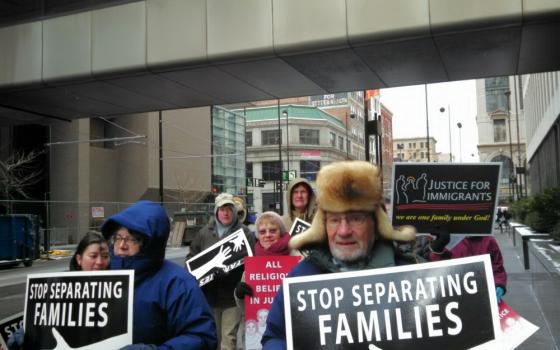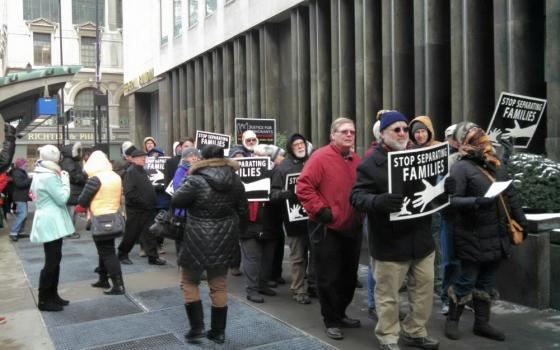I grew up, like most Catholics, thinking that Lent was a gloomy season when we stopped singing "Alleluia!" and eating candy because we had to be sorry for our sins for 40 days. The only good part about Lent was that I just might get to go to the parish fish fry on Friday evening and run around with my grade school buddies.
Sadly, I'm not sure that my understanding of Lent matured much more than that until recent years.
I'll never forget the moment I learned that the word "Lent" comes from the Old English word "lencten," which means, of all things, Spring! What a difference that makes in the way I approach this time. Lent is a season full of promise. It brings growth and blossoms new life. It bears fruit in our lives and our world.
I'll also never forget when I began to really pay attention to the Lenten scriptures. Take today's first reading from Isaiah, for example:
This, rather, is the fasting that I wish:
releasing those bound unjustly,
untying the thongs of the yoke;
Setting free the oppressed,
breaking every yoke;Sharing your bread with the hungry,
sheltering the oppressed and the homeless;
Clothing the naked when you see them,
and not turning your back on your own.
There is a temptation, I think, to gloss over these words. The Old Testament from which they come may seem like irrelevant ancient history. But if we let them leap off of the page into our hearts, if we chew on them and digest them into our being, we may discover how fervently these words from Isaiah cry out to our current situation, attempting to shake us out of complacency and into compassionate action. They call us to a Lenten practice that is not purely personal.
Lent is a powerful invitation to both personal and societal transformation.
Pope Francis reminded us in his Lenten message from last year, "Indifference to our neighbor and to God also represents a real temptation for us Christians. Each year during Lent we need to hear once more the voice of the prophets who cry out and trouble our conscience."
In this spirit of societal change, I gathered with an ecumenical group for a vigil of solidarity with immigrants on Ash Wednesday. We walked and prayed around the downtown Federal Building, making a visible statement while people passed by on their lunch breaks. Several of us distributed flyers explaining our reason for being there. Our undocumented immigrant community is, to use the word from Isaiah, bound in many ways, forced to live as an oppressed second class of people in our country. The circumstances of their lives are often imbued with fear, anxiety and struggle. This week, the distress is heightened.
The phone call came around noon last Tuesday. We received word that Immigration and Customs Enforcement (ICE) agents had come much earlier that morning to a local apartment complex where mostly Latino families make their homes. My heart plummeted into my stomach. I minister at a Catholic parish nearby, and some of our parishioners and students reside in this particular area.
Our school identified these families, and I called the parents to ensure that nothing had happened to them. A few of the people with whom I talked had left for their factory jobs so early that they weren't around the apartments when ICE came. Others had heard about it from their neighbors but hadn't witnessed it themselves. One woman I called had spoken directly with an ICE officer. He approached her in the parking lot of the apartment complex and asked her to produce her ID. When she did, he said, "You're not the one we're looking for," and she was free to go.
Everyone I talked to was on edge and wondering might happen next. Following the early January immigration deportation action in North Carolina, Georgia, and Texas, fear was already heightened in immigrant communities across the U.S. Our local Latino immigrants and allies now are reasonably worried that similar immigration raids, targeting Central American women and children, might be coming to our city.
Many of the families I know and love are made up of undocumented parents and citizen children. In the case of deportation, they would have to make a painful decision. Would they take everyone back to the home country, a place that is foreign to their children, in order to keep their family together? Or, would they leave their beloved children here with other relatives so that they grow up in the United States, safe and getting a quality education, but thousands of miles from mom and dad? Forcing families to face such heart-wrenching decision is an assault on family values that our country preaches to cherish.
Our worst fear is that a child will arrive home to an empty house, left vacant by the surprise deportation of a parent. Community organizations have been making sure to distribute information so that local immigrants know their rights in case of an encounter with ICE. Unfortunately, we also have to encourage families to create a plan in case of deportation. Where should the children go? Is there money somewhere to make sure they are cared for? Are there other relatives nearby? Is there contact information for family in the country of origin?
These people, our sisters and brothers, are the reason for our Ash Wednesday vigil.
Toward the end of the hour of walking prayerfully on the downtown streets, I began to notice many passersby with fresh-looking ashes on their foreheads. Noon Masses were likely letting out. I approached these fellow Catholics, an information sheet in my outstretched hand and said, "This is an Ash Wednesday vigil. Can I give you some information about why we are here?"
Most of them physically turned their bodies from me without saying anything and kept walking. A few made eye contact and said, "No thanks." Only one or two out of probably 20 ash-bearing people actually took the flyer and looked interested in learning more. I found myself snubbed over and over again. Had these people not just shared Eucharist, the sacrament that reminds us of our communion with all people and Creation? Had they not just entered into Lent, a time for personal and societal transformation?
Although I was disappointed, I wasn't shocked. The experience points to the unfortunate disconnect in the average Catholic's understanding of Lent. Most Catholics would think nothing of walking out of an Ash Wednesday Mass and subsequently neglecting to learn more about a suffering, vulnerable population in our community.
We have too long lived Lent as an insular journey of empty sacrifice or 40-day self-improvement initiative. Of course, the call to personal conversion is central to this liturgical season. Lent invites us to return to God with our whole heart. It leads us to experience the transformative mercy of God. This is beautiful, powerful and urgently needed in our world.
But, conversion is worth nothing if it doesn't propel us outside of ourselves.
Lent must not be rote and surface-level, marked only by less chocolate and more fish-fries. As long as there are people in our world who are bound unjustly, oppressed, hungry, homeless and naked, Lent cannot be just for me, or just for you. These 40 days call us to much more. We are, by nature, communal, societal beings. How can your practice of fasting, prayer and giving honor that? How can this Lent stretch you beyond the walls of your heart and home to embrace the world?
I can't imagine the transformation that could take place if all Catholics committed to a Lent for the whole world.
Fr. John Meoska said it well in a reflection that appears in Give Us This Day:
"Undertake a fast that will truly be life changing, not only for yourself, but for all God's holy people."
[Tracy Kemme is a Sister of Charity of Cincinnati. Author of the blog, Diary of a Sister-in-Training, Tracy is excited about the future of religious life! She currently ministers at the Catholic Social Action Office in Cincinnati and as the Latino Ministry Coordinator at a local parish.]


